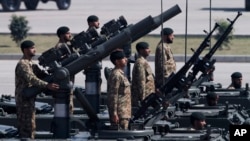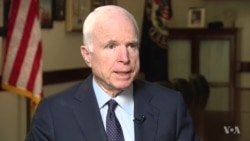The United States should cut off financial and military aid to Pakistan's government, a U.S. lawmaker said this week, because Pakistan's powerful military establishment and intelligence services have not broken off their links to terrorist groups.
“Fifteen years have passed since September 11, billions of dollars have been spent and far too little change has occurred in Pakistan,” according to Congressman Matt Salmon of the House Foreign Affairs Committee. He was speaking Tuesday at a hearing of the foreign-affairs group's Asia and Pacific subcommittee, which he chairs, titled: “Pakistan: Friend or Foe in the Fight against Terrorism.”
“The United States has spent tens of billions in taxpayers’ dollars in the form of aid to Pakistan since September 11, all in the hope that Pakistan would become a partner in the fight against terrorism,” said Salmon. "Unfortunately, despite the significant investment, Pakistani military and intelligence services are still linked to terrorist groups."
A Pakistan-based analyst, retired brigadier Saeed Nazir, objected to Salmon's remarks and even the title of the hearing, since he contends the United States does not consider Pakistan a real friend.
“On the one hand, Washington keeps favoring Pakistan’s arch-rival India, but on the other, Pakistan’s loyalty is questioned," Nazir told VOA.
"The United States also went ahead with a civil nuclear deal with New Delhi which has been a great source of concern for Pakistan,” Nazir said.
The analyst, who is affiliated with Institute of Policy Studies in Islamabad, said the financial assistance Pakistan receives from the United States to fight terrorists is no substitute for the lives lost and economic damage it has suffered in recent years.
“Pakistan was forced into the war when Bush administration declared, ‘You are either with us or against us,’" Nazir said. "Since then, the country has suffered enormously, by losing thousands of lives and damage to its economy.”
Testifying at the congressional hearing, former U.S. Ambassador to Afghanistan and Iraq Zalmay Khalilzad agreed with Salmon and other critics of Pakistan. He accused Islamabad of giving shelter to militants attempting to destabilize Afghanistan.
“It is also clear that the Pakistani military and intelligence provide sanctuary and support to the Taliban,” Khalilzad said, adding that Taliban extremists have provided sanctuary for members of the al-Qaida network. The veteran U.S. diplomat noted that al-Qaida leader Ayman al-Zawahiri has pledged allegiance to the new Taliban leader in Afghanistan.
Nazir rejects the notion that Pakistan is not a partner in peace. “Pakistan is trying to play a role to facilitate talks between the Afghan government and the Taliban,” he said.
Islamabad denies that it favors any militant or terrorist groups, and says it is making across-the-board efforts against all militants.
U.S. Senator John McCain, a recent visitor to both Pakistan and Afghanistan, told VOA he informed Pakistani leaders that the United States wants to see progress in their fight against terrorist groups.
The Arizona senator said he is deeply concerned about relations between Afghanistan and Pakistan, and that the two countries need to work together.
“The Afghan government, as well as the Pakistani government, as well as the American government should understand the fundamentals of the warfare. And that is when the enemy has a sanctuary, as in the case of some of these organizations in Pakistan, you are not going to win the conflict,” McCain told VOA. “I am encouraging dialogue - discussion, not public condemnation of each other.
"Everybody knows what the situation is. I believe that it is important for Pakistan to show progress. I believe they should be given an opportunity to do so,” McCain added.














